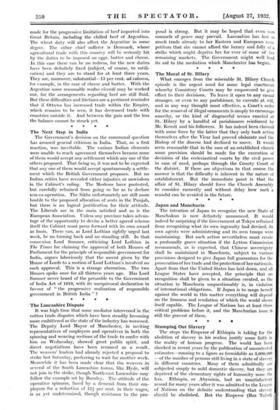The Next Step in India The Government's decision on the
communal question has aroused general criticism in India. That, as a first reaction, was inevitable. The various Indian elements were unable to reach agreement themselves because none of them would accept any settlement which any one of the others proposed. That being so, it was not to be expected that any one of them would accept spontaneously a settle- ment which the British Government proposes. But no Indian critics have revealed either injustice or unwisdom in the Cabinet's ruling. The Moslems have protested, but carefully refrained from going so far as to declare non-co-operation. The Sikhs unfortunately are still more hostile to the proposed allocation of seats in the Punjab, but there is no logical justification for their attitude. The Liberals are in the main satisfied and so is the European Association. Unless any province takes advan- tage of the opportunity to devise a better agreed scheme itself the Cabinet must press forward with its own award as basis. There can, as Lord Lothian rightly urged last week, be no turning back and no standing still. In that connexion Lord Sumner, criticizing Lord Lothian in The Times for claiming the approval of both Houses of Parliament for the principle of responsible government for India, argues laboriously that the assent given by the House of Lords to a motion of Lord Lothian's involved no such approval. This is a strange aberration. The two Houses spoke once for all thirteen years ago. Has Lord Sumner never heard of the preamble to the Government of India Act of 1919, with its unequivocal declaration in favour of " the progressive realization of responsible government in British India " ?


























 Previous page
Previous page